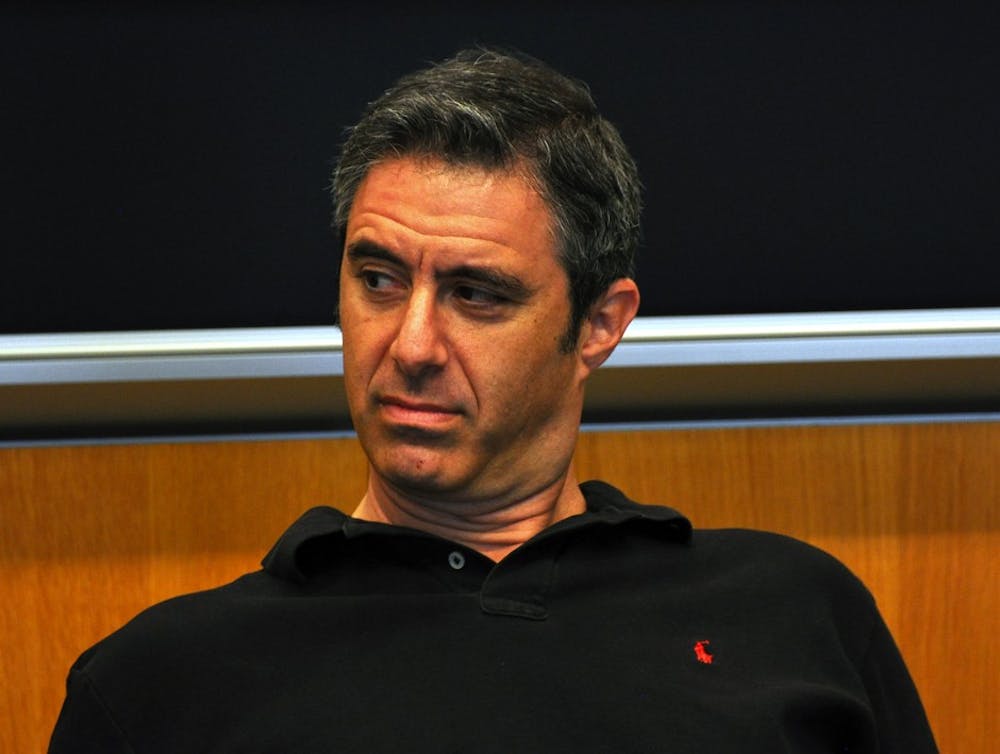
New York Times reporter and Penn alum Alan Schwarz hopes the documentary “Head Games” raises awareness of the prevalence of brain trauma in sports.
Replacement refs may have stolen many of the NFL season’s early headlines, but a number of researchers want people to focus on a more important discussion going on far beyond the playing field.
A contingent of researchers — including several from the Penn community — came together to make “Head Games,” a documentary about brain trauma in sports.
“Head Games” is based off the 2006 novel of the same name by Christopher Nowinski, a Harvard graduate and former all-Ivy defensive tackle and WWE fighter. Alan Schwarz, a 1990 Penn graduate and current reporter for The New York Times, read Nowinski’s manuscript in the summer of 2005 and immediately recognized the significance of the work.
“I was incredibly impressed with it,” said Schwarz, who served as an associate producer of the documentary. “He called me, but I get calls like that all the time, not necessarily from professional wrestlers who had played football at Harvard … This one was clearly different. I was very disappointed when everyone blew him off. I thought what he had was pretty important.”
Schwarz, who was one of the nation’s leading journalists on concussions and brain trauma in sports, published controversial stories about suicide victims Andre Waters, a former NFL player, and Penn’s Owen Thomas. He helped enormously in bringing what was once called the “silent epidemic” to the country’s attention and was nominated for a Pulitzer Prize for his work.
“It was clear from the manuscript that concussions were significantly more serious than most people, including me, had any idea,” Schwarz said. “I saw it as important and something that should be published. But I certainly didn’t think it was going to become the public health issue of our time.”
A significant portion of the documentary was devoted to the story of Thomas, a Penn junior and captain of the football team who committed suicide in the spring of 2010.
The autopsy of Thomas’ brain revealed he had early signs of chronic traumatic encephalopathy, a disease that studies have linked to repeated brain trauma from football. The disease may have been a major cause in his death.
But the scientific research behind the causes and long-term effects of concussions is still in the infancy stage. The implications from the research on Thomas’ brain are still inconclusive.
That is where researchers like Douglas Smith and others at the Penn Center for Brain Injury and Repair come in.
“We have 25 professors studying traumatic brain injury,” Smith said. “This is the biggest and oldest center in the country.”
Smith also said the center is known for “defining part of what is widely believed to be the injury in concussion, Diffuse Axonal Injury,” in the early 1980s.
Smith and several other doctors at Penn’s Perelman School of Medicine were involved in the “Head Games” documentary.
“The real surprise came about three years ago when the local NBC channel was talking about the [Philadelphia] Eagles and they used the acronym TBI (traumatic brain injury). I was shocked,” Smith said. “People know what AIDS is — there are about 2 million people in the U.S. with AIDS. They know what spinal cord injury is — about 10,000 people get spinal cord injury each year. And nobody knows what that acronym — TBI — is, which happens to 2 million people every year.”
Penn Athletics was also involved, with both head trainer Eric Laudano and the men’s lacrosse team making appearances in the documentary.
Laudano provided some insight into how trainers are increasing the safety of college athletics with new practices and approaches toward brain injuries.
Though neither Schwarz nor Smith see Head Games as enough to spark widespread change, both hope it is a critical step forward in launching the debate into the public sphere.
“The movie is a wake-up call,” Smith said. “It doesn’t have enough information to be highly informative but this could be used as an educational platform.”
The film has been released to theaters on a limited basis but is available on-demand through iTunes and Amazon video.
“I think ignorance has a half-life. It erodes but it never disappears,” Schwarz said. “While the work we did at the New York Times did a lot to hasten the erosion of that ignorance toward this injury and how serious it can be, we certainly didn’t eradicate it.”
This article has been updated to reflect that Schwarz was an associate producer, not the executive producer, of the documentary.
SEE ALSO
One year later, students honor Owen Thomas
Silcox | Remembering Owen Thomas
Strong | Head trauma study is a no-brainer
The Daily Pennsylvanian is an independent, student-run newspaper. Please consider making a donation to support the coverage that shapes the University. Your generosity ensures a future of strong journalism at Penn.
DonatePlease note All comments are eligible for publication in The Daily Pennsylvanian.








